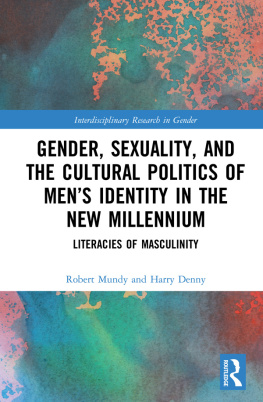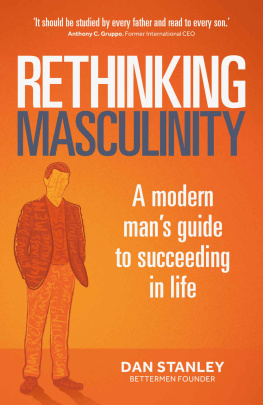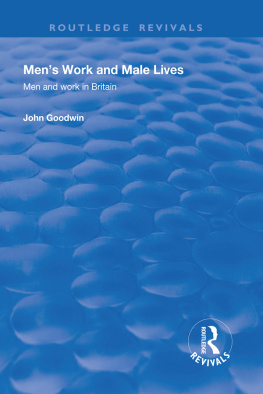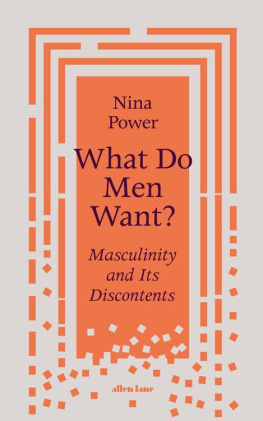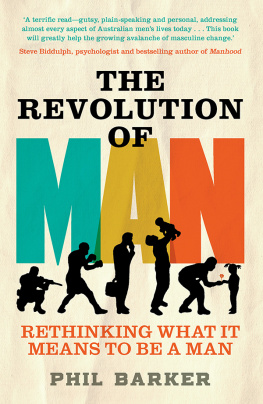Mens Ways of Being
New Directions in Theory and Psychology
First published 1996 by Westview Press
Published 2018 by Routledge
711 Third Avenue, New York, NY 10017, USA
2 Park Square, Milton Park, Abingdon, Oxon OX14 4RN
Routledge is an imprint of the Taylor & Francis Group, an informa business
Copyright 1996 Taylor & Francis
All rights reserved. No part of this book may be reprinted or reproduced or utilised in any form or by any electronic, mechanical, or other means, now known or hereafter invented, including photocopying and recording, or in any information storage or retrieval system, without permission in writing from the publishers.
Notice:
Product or corporate names may be trademarks or registered trademarks, and are used only for identification and explanation without intent to infringe.
Library of Congress Cataloging-in-Publication Data
Mens ways of being / edited by Christopher McLean, Maggie Carey, and Cheryl White.
p. cm.
Includes bibliographical references and index.
ISBN 0-8133-2652-4 (hardcover).0-8133-2653-2 (pbk.)
1. Men. I. McLean, Christopher. II. Carey, Maggie. III. White,
Cheryl.
HQ1090.M475 1996
305.31dc20
95-52166
CIP
ISBN 13: 978-0-8133-2653-5 (pbk)
New Directions in Theory and Psychology
Series Editors
Rachel T. Hare-Mustin and Jeanne Marecek
Focusing on emerging theory in psychology and related fields, this scholarly/trade series examines contemporary ideas broadly associated with postmodernism, social contructionism, feminist theory, and other critical reformulations of psychology. We seek manuscripts that propose or exemplify new ways of doing psychology, that reconsider foundational assumptions of psychological inquiry and practice, and that offer new approaches to therapy theory and practice. Among the topics considered are the social construction of such categories of difference/hierarchy as gender, race and ethnicity, class, and sexuality; and the politics of knowledge. Of interest as well are works that examine ways in which psychologyas a body of knowledge and a cultural institutionreplicates or challenges arrangements of power and privilege in society.
Rachel T. Hare-Mustin, Villanova University, and Jeanne Marecek, Swarthmore College, coauthored Making a Difference: Psychology and the Construction of Gender
BOOKS IN THIS SERIES
Mens Ways of Being, edited by Christopher McLean, Maggie Carey, and Cheryl White
Sex Is Not a Natural Act and Other Essays, Leonore Tiefer
Celebrating the Other: A Dialogic Account of Human Nature, Edward E. Sampson
Seldom Seen, Rarely Heard: Women s Place in Psychology, edited by Janis S. Bohan
The following papers in this book have been published previously, and have been included with permission from the relevant publisher/s:
Carey, M. 1992. Healing the Mother Wound. Dulwich Centre Newsletter, 3&4.
Perspectives on the Mens Movement. Dulwich Centre Newsletter, 3&4.
Hall, R. 1992. Partnership Accountability. Dulwich Centre Newsletter, 3&4.
Law, I. 1992. Adopting the Principle of Pro-Feminism. Dulwich Centre Newsletter, 3&4.
Lee, P. 1991. Growing Up as a Man. Dulwich Centre Newsletter, 1.
Smith, G. 1992. Dichotomies in the Making of Men. Dulwich Centre Newsletter, 3&4.
Tamasese, K. & Waidegrave, C. 1993. Cultural and Gender Accountability in the Just Therapy Approach. Journal of Feminist Family Therapy, 5(2):29- 45. Republished 1994 in Dulwich Centre Newsletter, 2&3:55-67.
Ward, B. 1992. A Feminist Journeying in Relation to Men. Dulwich Centre Newsletter, 3&4.
White, M. 1992. Mens Culture, the Mens Movement, and the Constitution of Men's Lives. Dulwich Centre Newsletter, 3&4.
Mens Ways of Being represents a dramatic turning point in the debate on what it is to be a man, an insightful rethinking of the questions of men and masculinity. These brilliant and thoughtful essays do not stop with mens fears and pain, but show how men can take action to change the very demands of masculinity.
The common belief is that nature defines what it is to be a man. The prescriptions for masculinity and the restraints on men at deviating from the standards for masculinity are seldom questioned. Men do not typically ask: In what way does my being a man influence or distort what I am doing? Men have been regarded as true representatives of society. Being a real mans man means being superior to women and other lesser men, being a warrior, a hero. Since maleness has provided the standard, to aspire to its opposite is meaningless. What would a real womans woman be? A woman can only be as good as a man, there is no point in being as good as a woman, was the way Dale Spender put it some years ago. At various points in history, women have questioned the implications of the male standard and asked what it is to be a woman. Only recently, in response to the contemporary feminist movement, have men begun to question what it is to be a man.
Mens Ways of Being calls for an examination of how men maintain patriarchy by fiercely disciplining each other to be real men, and to uphold the standard of dominant masculinity. Nothing cuts closer to the bone than mens fears about being seen as womanly, and the contempt and condescension of a patriarchal system towards traits deemed feminine. The sanctions for deviating from traditional masculinity are indeed harsh, as Laurence Carter relates in experiencing discrimination against homosexuals, and Peter Lee describes in a moving personal account of struggling with problems in school, in manly sports, and marriage.
As the authors in this book observe, the term mens movement encompasses a diverse range of orientations and activities. One orientation emphasises personal growth mens rights, and mens liberation, purportedly achieved by rejecting the soft man and the influence of women. Mothers, especially, have traditionally been regarded as having malevolent power that weakens and contaminates men. Some of mens actions in this segment of the mens movement have been troubling, not only to women, but to other men.
Many analysts have also questioned the backlash from angry white males who see themselves as victims of women and minorities who are presumably benefitting unfairly at mens expense. Others have criticised the self-preoccupation of some mens groups. As Business Week (a leading business magazine in the United States) observed, theres no question that navigating the shoals of masculinity today is a difficult and dangerous business. But... forever questing for fulfillment is one big bellyful of narcissistic nonsense (Sept. 13, 1993). In contrast to those mens groups emphasising self-enhancement, personal growth, or mens rights, other men have organised in groups that are anti-sexist and pro-feminist. These groups have challenged the oppression of women and children by men, and engaged in activities directed at countering the sexual abuse and battering of women and girls by men.
This book presents a third way for men. It acknowledges mens confusion and pain without denying mens privilege and dominance. It clarifies the issues of oppression and patriarchal power. It recognises that the notion of mens and womens parallel struggles often conceals anti-feminism. It anchors theory in personal action and the lived experiences of boys and men. It calls for mens cooperation with women and subordinated groups. And ultimately it focusses on change - the ways individuals and institutions can change that will lead to new forms of masculinity and equality among men and women. The relevance of this new framework extends far beyond merely balancing gender tasks or sex roles to include concern for those in marginalised social groups.



